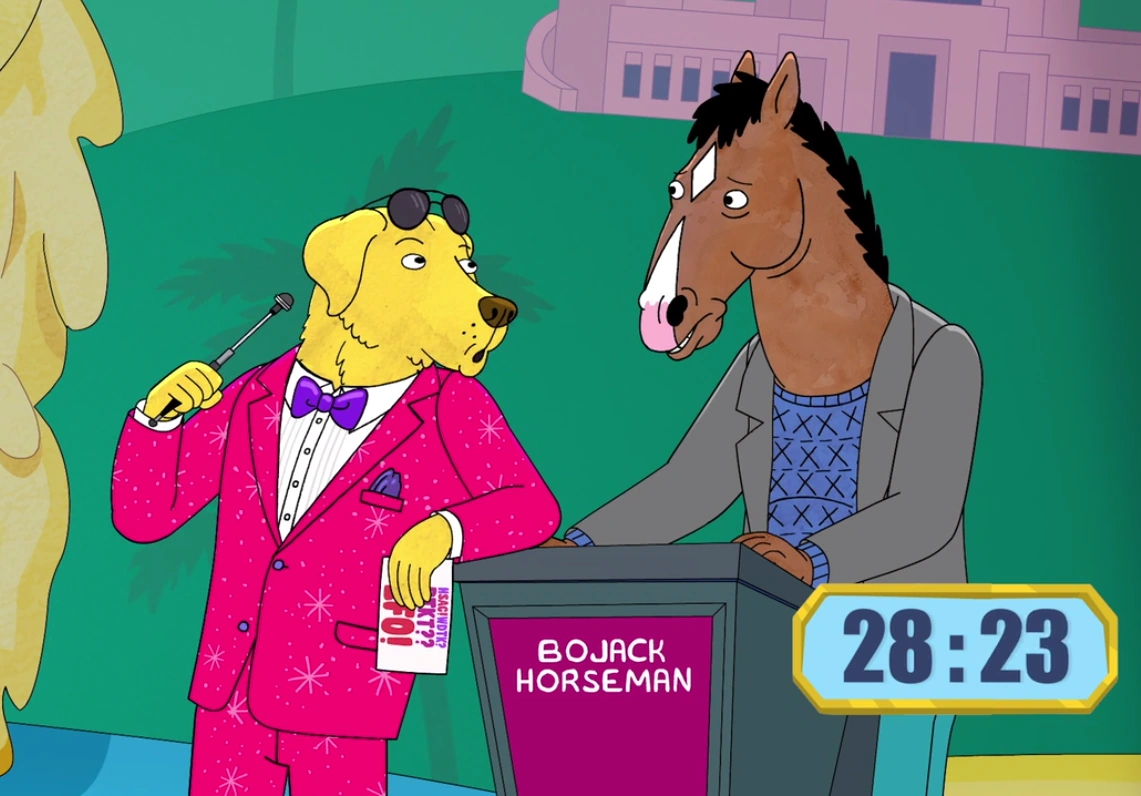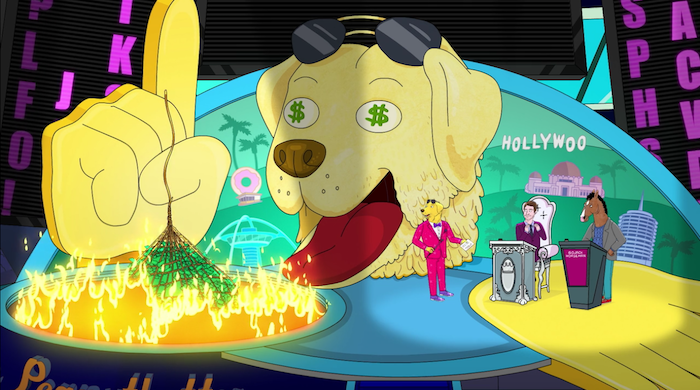BoJack Horseman is a sad show. Its characters are unhappy with their lives; its viewers are often dejected upon seeing an episode’s downer conclusion, which is the kind of ending the series prefers. It actively punishes the audience for rooting for its characters. Most critics identify the despairing mood: Ian Crouch of the New Yorker describes the show as “incessantly bleak”1. But the reasons they give for this despair – the depression of the main character, the cruelty of some of his decisions – do not fully capture why the show is so emotionally powerful. BoJack Horseman succeeds at making the viewer miserable by offering a sincere vision of happiness and rejecting it. Twenty-five minutes watching a depressed anthropomorphic cartoon horse win a game show will convince you that glimpses of utopia can make you sad.
Heavy stuff, particularly for a show with a premise as silly as BoJack Horseman’s. The show’s eponymous protagonist is a large cartoon horse who walks, talks, and feels like a human. He is a former sitcom actor who, having made more money than he knows what to do with, mostly spends his time drinking to abuse while watching episodes of his old TV show. He is severely depressed. The first season chronicles his attempt to return to cultural relevance by writing a best-selling book, an endeavor he undertakes because he believes becoming famous again would make him happy. He is unsuccessful in his attempt at happiness, but does manage to re-enter the public eye; he is cast to star in a biopic about Secretariat, which is where the second season begins. The eighth episode of the second season, titled “Let’s Find Out”, finds BoJack on a trivia game show for celebrities hosted by his cheerful rival, Mr. Peanutbutter. (Mr. Peanutbutter is a yellow lab who also acts like a human; in the world of the show, all animals act like people.) The show is on a network run by BoJack’s girlfriend, an owl named Wanda.

“Let’s Find Out” makes BoJack into an anti-hero, someone who, despite being constantly embarrassed and defeated, is able to show surprising resilience. Anti-heroes are “weak”, “ineffectual”, and “inept”, which certainly describes BoJack during the first segment of the game show2. He gives a series of wrong answers to astoundingly difficult and trivial questions (“what is the average rainfall in Bora Bora?”), for which he is mocked mercilessly by Mr. Peanutbutter. He has his alcoholism exposed on national television. When he attempts a witty rejoinder to some of Mr. Peanutbutter’s abuse, he is booed loudly by the studio audience. The ultimate embarrassment comes in the form of a surprise: the show is joined by a second, “big” celebrity, the actor Daniel Radcliffe, relegating BoJack to the status of “little” celebrity. When BoJack tries to greet Radcliffe, whom he’s met before, as equals, he is snubbed – the “big celebrity” has forgotten they’ve ever been introduced. It’s this sense of slight, of injustice, that provokes empathy. The viewer roots for BoJack because of his perseverance in defiance of humiliation.
But BoJack is not depicted as stupid or weak, no matter how many questions he answers incorrectly. Instead, he is presented as a smart victim of an unfair system, which allows the show to shift its critique from its character to the society he exists in. The absurdity is apparent from the game show’s first segment, a “small talk round” during which BoJack is punished for his correct descriptions of his activities the night before, and continues through the trivia questions, as when he incorrectly selects “D, all of the above” for a question whose answer is “A and B, with C also being acceptable”. Daniel Radcliffe, his adversary, gets to answer questions about colors (“blue and yellow combined makes green”) and snatch cash out of the air while BoJack is given a minute to write an essay on European history. His thesis statement is strong and reveals a surprising amount of knowledge about the causes of the French Revolution, but this doesn’t matter: his essay is tossed in the trash and his humiliation continues. His intelligence is irrelevant; there is seemingly no way for him to win. In ensuring its protagonist is a victim of circumstance instead of his own personal failings, the show uses the anti-hero as a way to gain identification from the audience, who can empathize with the experience of unfair treatment despite adequate qualifications.
This identified injustice sets the show up for a utopian solution. Utopian moments in film address inadequacies in society with an idealized remedy, an example of what a better world would look like3. In “Let’s Find Out”, Bojack is informed of Mr. Peanutbutter’s “tell”: whenever the dog gets excited, his ears flop upwards, giving away the correct response to the trivia questions. It allows for a montage of Bojack shouting zany answers while Daniel Radcliffe and Mr. Peanutbutter look on incredulously. The show works here on a utopian level, BoJack’s mistreatment in an absurd system corrected by the cleverness that had been previously stifled. It imagines, briefly, an ideal world where a competition of knowledge is won by the smarter person.
But the show rejects this notion of utopia almost as soon as it appears and replaces it with a different one. During a commercial break, BoJack’s girlfriend Wanda approaches him to ask for a favor: she needs him to throw the game. In coming dangerously close to winning, he has upset the game show’s viewers, who are rooting for Daniel Radcliffe and whom she needs to satisfy as part of her job at the network. This request might seem narrative interrupting the ideal world, a betrayal of the previously-extended utopian vision; that’s because it is. It’s explicitly a return to the unjust former state, where the game is rigged to favor the undeserving. A different form of utopia is offered in its place, one that could be described as dealing with “representations of interpersonal relationships”4. This kind of utopian scene imagines what relationships would look like in a freer, better world, unconstrained by patriarchal or capitalist notions of self-interest. Wanda’s asking allows BoJack the opportunity to deepen their relationship by performing a selfless act. The utopian dimensions are clear: the viewer watches the character they identify with ameliorate his isolation by incurring a cost to himself to move close to another person, a decision that addresses real alienation by showing them a better world, one in which someone will sacrifice for you. Before BoJack flubs the final question on purpose, sentimental music plays as BoJack glances at Wanda. His selfless act will presumably be rewarded.

It is not. The show refuses to honor its utopian promise. The question BoJack intentionally blunders away is about Secretariat, the horse he is playing in an upcoming movie. For this mistake he is ridiculed endlessly by Mr. Peanutbutter and laughed at by Daniel Radcliffe and the audience, a humiliation that is too much for BoJack to endure. While he at first protests meekly, asking Mr. Peanutbutter to quickly move on, the continued mockery turns him cruel, leading him attack Mr. Peanutbutter by saying the dog’s wife took a job in a war-torn country just to escape their awful marriage. It’s petty and harsh. Whatever benefit he got from his utopian moment is shown to pale in comparison to the pain of the mockery he had to endure after it.
This can be seen as narrative intruding on utopian moments, a circumstance that, in Dyer’s writing on the subject, did not diminish the importance of the utopian scene itself5. To the contrary, such disruptions throw the moment of utopian solution into stark relief: this is how much it stands out when compared to the world we live in today. But “Let’s Find Out” denies the viewer the comfort of this interpretation. At the end of the episode, BoJack is offered an opportunity to redeem himself for his bitterness. If he answers a question correctly, the game show will donate a million dollars to charity; if he gets it wrong, the show will set ablaze the half-million it had already pledged. The question is an easy one: who played the titular role in the Harry Potter films? It’s clear that BoJack knows the answer, but pretends to be confused, mirroring Daniel Radcliffe’s earlier ignorance of his name. The answer he gives, over dramatic music, shocks everyone: “Elijah Wood?”. The sheer cruelty of the decision to burn a half-million dollars for charity to make a point in a petty feud is astounding, and would be depressing enough on its own. But the fact that the decision is clearly made to parallel the previous moment of utopia makes it especially devastating. When BoJack answers a question wrong to make Wanda happy, it is about a movie he is starring in; when BoJack answers a question wrong to spite Daniel Radcliffe, it is about a movie Radcliffe starred in. In both circumstances, the camera cuts, accompanied by music, to Wanda looking expectantly in the tunnel before focusing back on BoJack’s face as he answers. The parallels are the show’s way of equating the two decisions. The fleeting moment of utopia cannot last, and the vulnerability it required exposed BoJack to abuse harsh enough to engender intense spite. The decision to give an incorrect answer can be seen as a dark utopian moment, a fantasy for the viewer where they have the power to take out their justifiable frustrations in the most destructive way possible. This fantasy is never corrected; it is the note on which episode ends. The utopian moment of interpersonal happiness is snatched away and replaced by cruelty.
“Let’s Find Out” complies with the notion that art works by giving its audience an idea of a massively better world, but does not use its utopian vision to the same effect. In most entertainment, the utopia is meant to be savored, shown in contrast to the inadequacies of the society they inhabit. BoJack Horseman provides a glimpse of a freer, more intimate society only to crush it viciously. It complicates the utopian theory of culture by proving utopian visions can be used to make people sad. Some art argues that better world is only possible in your imagination, and that your fantasies only deepen your inevitable despair upon being crushed by the society you actually inhabit. When a huge pile of cash is dropped into a roaring fire, the audience’s utopian hopes drop with it. The world offers to give money to charity and burns it out of spite.
